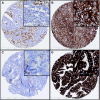Human leukocyte antigen class I expression is an independent prognostic factor in advanced ovarian cancer resistant to first-line platinum chemotherapy
- PMID: 19755991
- PMCID: PMC2768455
- DOI: 10.1038/sj.bjc.6605315
Human leukocyte antigen class I expression is an independent prognostic factor in advanced ovarian cancer resistant to first-line platinum chemotherapy
Abstract
Background: Loss of HLA class I is important in ovarian cancer prognosis but its role as a prognostic indicator in relation to therapy remains unproven. We studied the prognostic potential of this antigen and its significance in relation to platinum therapy.
Methods: A total of 157 primary ovarian cancers were assessed for HLA class I immunohistochemically and linked to a comprehensive database of clinicopathological variables, treatment details, and platinum sensitivity.
Results: Tumours expressing high levels of HLA class I had significantly improved survival (P=0.044). There was a 19-month difference in the median overall survival between tumours with high and low antigen expression. HLA class I antigen expression, stage, and platinum sensitivity were independently predictive of prognosis on multivariate analysis. HLA class I antigen was shown to be expressed at higher levels in patients with good overall survival in platinum-resistant patients (P=0.042). HLA class I significantly correlated with overall survival on multivariate analyses (P=0.034).
Conclusion: Low-level HLA class I expression is an independent prognostic indicator of poor clinical outcome in ovarian cancer. The survival advantage of patients with platinum-resistant tumours expressing high levels of HLA class I suggests that immunotherapy may be of use in these ovarian cancers resistant to standard chemotherapy.
Figures



Similar articles
-
Prognostic impact of human leukocyte antigen class I expression and association of platinum resistance with immunologic profiles in epithelial ovarian cancer.Cancer Immunol Res. 2014 Dec;2(12):1220-9. doi: 10.1158/2326-6066.CIR-14-0101. Epub 2014 Oct 16. Cancer Immunol Res. 2014. PMID: 25324403
-
Human leukocyte antigen class I antigen expression is an independent prognostic factor in ovarian cancer.Clin Cancer Res. 2007 Jun 15;13(12):3591-6. doi: 10.1158/1078-0432.CCR-06-2087. Clin Cancer Res. 2007. PMID: 17575223
-
Serum D-dimer, albumin and systemic inflammatory response markers in ovarian clear cell carcinoma and their prognostic implications.J Ovarian Res. 2020 Aug 8;13(1):89. doi: 10.1186/s13048-020-00693-w. J Ovarian Res. 2020. PMID: 32771026 Free PMC article.
-
Medical therapy of advanced malignant epithelial tumours of the ovary.Forum (Genova). 2000 Oct-Dec;10(4):323-32. Forum (Genova). 2000. PMID: 11535983 Review.
-
Erlotinib or gefitinib for the treatment of relapsed platinum pretreated non-small cell lung cancer and ovarian cancer: a systematic review.Drug Resist Updat. 2011 Jun;14(3):177-90. doi: 10.1016/j.drup.2011.02.004. Epub 2011 Mar 24. Drug Resist Updat. 2011. PMID: 21435938 Review.
Cited by
-
Gemcitabine enhances the efficacy of reovirus-based oncotherapy through anti-tumour immunological mechanisms.Br J Cancer. 2014 Jan 7;110(1):83-93. doi: 10.1038/bjc.2013.695. Epub 2013 Nov 26. Br J Cancer. 2014. PMID: 24281006 Free PMC article.
-
The immune modifying effects of chemotherapy and advances in chemo-immunotherapy.Pharmacol Ther. 2022 Aug;236:108111. doi: 10.1016/j.pharmthera.2022.108111. Epub 2022 Jan 10. Pharmacol Ther. 2022. PMID: 35016920 Free PMC article. Review.
-
HLA-G expression is an independent predictor for improved survival in high grade ovarian carcinomas.J Immunol Res. 2014;2014:274584. doi: 10.1155/2014/274584. Epub 2014 May 27. J Immunol Res. 2014. PMID: 24987709 Free PMC article.
-
Understanding heterogeneous tumor microenvironment in metastatic melanoma.PLoS One. 2019 Jun 5;14(6):e0216485. doi: 10.1371/journal.pone.0216485. eCollection 2019. PLoS One. 2019. PMID: 31166985 Free PMC article.
-
HLA class I as a predictor of clinical prognosis and CTL infiltration as a predictor of chemosensitivity in ovarian cancer.Oncoimmunology. 2015 Mar 23;4(5):e1005507. doi: 10.1080/2162402X.2015.1005507. eCollection 2015 May. Oncoimmunology. 2015. PMID: 26155404 Free PMC article.
References
-
- Bookman MA, for the Gynecologic Cancer InterGroup through the Gynecologic Oncology, G (2006) GOG0182-ICON5: 5-arm phase III randomized trial of paclitaxel (P) and carboplatin (C) vs combinations with gemcitabine (G), PEG-lipososomal doxorubicin (D), or topotecan (T) in patients (pts) with advanced-stage epithelial ovarian (EOC) or primary peritoneal (PPC) carcinoma. J Clin Oncol (Meeting Abstracts) 24: 5002
-
- Bouvier M (2003) Accessory proteins and the assembly of human class I MHC molecules: a molecular and structural perspective. Mol Immunol 39: 697–706 - PubMed
-
- Dunn GP, Bruce AT, Ikeda H, Old LJ, Schreiber RD (2002) Cancer immunoediting: from immunosurveillance to tumor escape. Nat Immunol 3: 991–998 - PubMed
-
- Garrido F, Algarra I (2001) MHC antigens and tumor escape from immune surveillance. Adv Cancer Res 83: 117–158 - PubMed
-
- Garrido F, Cabrera T, Concha A, Glew S, Ruiz-Cabello F, Stern PL (1993) Natural history of HLA expression during tumour development. Immunol Today 14: 491–499 - PubMed
Publication types
MeSH terms
Substances
LinkOut - more resources
Full Text Sources
Other Literature Sources
Medical
Research Materials

